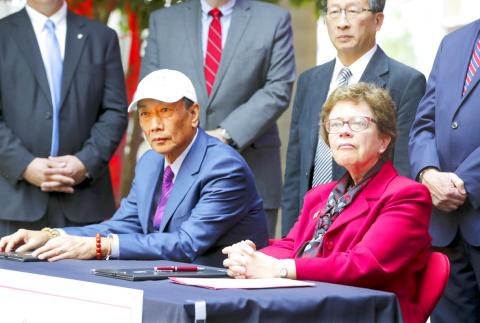Foxconn Technology Group (富士康科技集團) CEO Terry Gou (郭台銘) and University of Wisconsin-Madison (UW-Madison) chancellor Rebecca Blank on Monday signed an agreement that also calls for the creation of a science and technology institute on the UW-Madison campus that would collaborate closely with the display screen manufacturing plant being built in Mount Pleasant, about 160km southeast of Madison near the Illinois border.
Foxconn, known as Hon Hai Precision Industry Co (鴻海精密) in Taiwan, chose Wisconsin for its first plant outside of Asia after receiving generous incentives from the state.
Foxconn has said that the manufacturing campus could cost up to US$10 billion and eventually employ 13,000 people.

Photo: AP / Steve Apps / Wisconsin State Journal
Finding workers was expected to be a challenge in a state with low unemployment.
The deal announced on Monday would provide a conduit of potential interns and employees from the state’s largest university to the Foxconn plant.
“We’re going to be a long-term community member in the state of Wisconsin,” Foxconn executive Louis Woo (胡國輝) said.
“We see ourselves as an enabler of talent, that’s creation of jobs. We also see us as an enabler of technology,” he said.
The Foxconn Institute for Research in Science and Technology, to be created under the agreements, is to be a hub for technological innovation and provide an environment for research and development initiatives in medical science, materials science, computer and data-driven science.
The institute’s main location would be at the Foxconn manufacturing campus in Racine County, but it is also to have a presence in Madison.
The university said the agreements formalize its commitment to being a part of research with Foxconn, while Foxconn would assist with research, recruiting and creating job opportunities.
To receive the US$100 million from Foxconn, the university has to have to raise an equal amount over the next two years as part of a sub-campaign of its US$3.2 billion All Ways Forward fundraising effort.
The bulk of Foxconn’s US$100 million, which Blank said was the largest industry research partnership in the university’s history, would go toward constructing a new building on the engineering campus.
“I’m excited,” she said. “You don’t get $100 million gifts very often.”
Foxconn has also announced plans to open its North American office headquarters in Milwaukee and technology centers that could employ hundreds in Eau Claire and Green Bay.
Wisconsin Governor Scott Walker has praised the investments outside of Racine County, where the manufacturing campus is being built, saying it shows the positive statewide economic impact of the project.
State and local government incentives for the main Foxconn project in Racine County could top US$4 billion, mostly in cash payments from the state.
That price tag, the largest in US history for a foreign corporation, has drawn criticism from Democratic opponents of Walker, who negotiated the deal.
Wisconsin voters appear torn on the value of the Foxconn project.
In a Marquette University Law School poll conducted last week, 44 percent of registered voters said the state is paying more than the plant is worth.
A majority, 61 percent, said they felt the plant would substantially improve the Milwaukee-area economy, but an equal percentage said that businesses where they live would not directly benefit.

SEMICONDUCTORS: The German laser and plasma generator company will expand its local services as its specialized offerings support Taiwan’s semiconductor industries Trumpf SE + Co KG, a global leader in supplying laser technology and plasma generators used in chip production, is expanding its investments in Taiwan in an effort to deeply integrate into the global semiconductor supply chain in the pursuit of growth. The company, headquartered in Ditzingen, Germany, has invested significantly in a newly inaugurated regional technical center for plasma generators in Taoyuan, its latest expansion in Taiwan after being engaged in various industries for more than 25 years. The center, the first of its kind Trumpf built outside Germany, aims to serve customers from Taiwan, Japan, Southeast Asia and South Korea,

Gasoline and diesel prices at domestic fuel stations are to fall NT$0.2 per liter this week, down for a second consecutive week, CPC Corp, Taiwan (台灣中油) and Formosa Petrochemical Corp (台塑石化) announced yesterday. Effective today, gasoline prices at CPC and Formosa stations are to drop to NT$26.4, NT$27.9 and NT$29.9 per liter for 92, 95 and 98-octane unleaded gasoline respectively, the companies said in separate statements. The price of premium diesel is to fall to NT$24.8 per liter at CPC stations and NT$24.6 at Formosa pumps, they said. The price adjustments came even as international crude oil prices rose last week, as traders

Taiwan Semiconductor Manufacturing Co (TSMC, 台積電), which supplies advanced chips to Nvidia Corp and Apple Inc, yesterday reported NT$1.046 trillion (US$33.1 billion) in revenue for last quarter, driven by constantly strong demand for artificial intelligence (AI) chips, falling in the upper end of its forecast. Based on TSMC’s financial guidance, revenue would expand about 22 percent sequentially to the range from US$32.2 billion to US$33.4 billion during the final quarter of 2024, it told investors in October last year. Last year in total, revenue jumped 31.61 percent to NT$3.81 trillion, compared with NT$2.89 trillion generated in the year before, according to

PRECEDENTED TIMES: In news that surely does not shock, AI and tech exports drove a banner for exports last year as Taiwan’s economic growth experienced a flood tide Taiwan’s exports delivered a blockbuster finish to last year with last month’s shipments rising at the second-highest pace on record as demand for artificial intelligence (AI) hardware and advanced computing remained strong, the Ministry of Finance said yesterday. Exports surged 43.4 percent from a year earlier to US$62.48 billion last month, extending growth to 26 consecutive months. Imports climbed 14.9 percent to US$43.04 billion, the second-highest monthly level historically, resulting in a trade surplus of US$19.43 billion — more than double that of the year before. Department of Statistics Director-General Beatrice Tsai (蔡美娜) described the performance as “surprisingly outstanding,” forecasting export growth